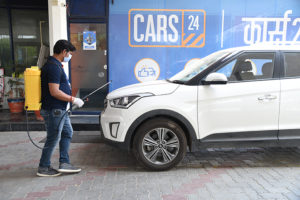As the government eases lockdown norms to boost the economy, automakers in India face tough times with slow sales and full inventories. In contrast, the market for pre-owned cars is doing well as commuters opt for the safety of private cars
In April 2020, amid the lockdown, factories came to standstill and sales in the automobile sector dropped to their all-time low of nil. Car companies in India are still facing tough times. Before the Coronavirus pandemic, the decision to implement Bharat Stage 6 emissions norms had the industry revamping its inventory which was made worse by a slowdown in sales last year. In August 2019, before the endemic was even a factor, data from SIAM (Society of Indian Automobile Manufacturers) showed that overall domestic sales fell by a record 23.55%. Come March, the pandemic made things even worse.
In March, lockdowns were announced to curb the spread of the Coronavirus, bringing normal life to a standstill. The nationwide lockdown which lasted till May proved to be a trying time for the auto industry. After facing its most difficult month in April 2020, carmakers restarted manufacturing and sales.
In May, just 36,536 units were registered across the auto sector which was a decline of 85% when compared to data from last year. And if experts are to be believed, it will take another couple of months before the auto industry will be able to reach its pre Covid numbers in sales.

A pickup is in sight, A total of 1,16,928 passenger vehicles were sold in the month of June when lockdown norms were gradually eased. The reopening of office spaces while public transport is still either struggling to keep pace with social distancing norms or is yet to be reopened, the demand for private vehicles is further expected to increase. A report by Deloitte says that 77% of consumers want to limit their use of public transport and 79% have intentions of purchasing private vehicles.
Even as the predictions point to a better future, the road there is not going to be an easy one. According to the report by Deloitte, car manufacturers have 20-30 days’ worth of finished goods, which they will offload into the market while offering heavy discounts to consumers. While this may be a good thing for the end-consumer, it is likely to hit dealerships and manufacturers. Another important factor in the revival of the auto sector is the scarcity of the migrant workforce, whose absence is likely to delay recovery. To top it all, despite repeated attempts by the government to dissuade companies from layoffs, this has not been the case. The fallout might be an increase in the number of loan defaults, which will put additional pressure on the already struggling auto sector.
“I had booked an SUV before the lockdown was announced, but due to the spread of the virus, the lockdown and the subsequent slowdown in business I have had to shelve my plans,” says Kartik (name changed on request). “We have already cancelled the booking and are now waiting to order a vehicle only when post-lockdown discounts on the purchase will be offered,” he adds.
While OEMs (original equipment manufacturers) struggle to keep abreast with changing times, the second-hand car market has seen a surge in sales. According to a report by the Quint, second-hand car dealership Cars24 carried out 3,000 transactions in May and over 9,500 transactions in June. When compared to their pre-lockdown sales volume, it is clear there has been an increase of 134% growth in the last week of June.
As the sale of pre-owned vehicles increases, more and more households are refraining from investing in newer vehicles and choosing to stick with vehicles they already own. “I had plans of selling off my Hyundai i10 as it had spent a major part of six years of my ownership parked inside the garage. However, looking at the need to avoid cabs and public transport, I have been rethinking”, says Haider Jawed, a lawyer based in Delhi.
Talking about the used passenger vehicle market, Winkle, a dealer based in Lucknow’s Lalbagh area says, “The second-hand car market has been getting a positive response since the lockdown was lifted. Locals who had been in two minds till now are now opting for personal vehicles despite public transport being up and running”.
So even though sales for automakers may still be tepid, sales of second-hand cars have picked up. And as the restrictions keep on easing, sales in the coming months are expected to rise as more and more people opt for private vehicles.
(Cover: As lockdown restrictions are being eased, car sales have picked up, more so in the second-hand car market // Photo: Gomechanic)





